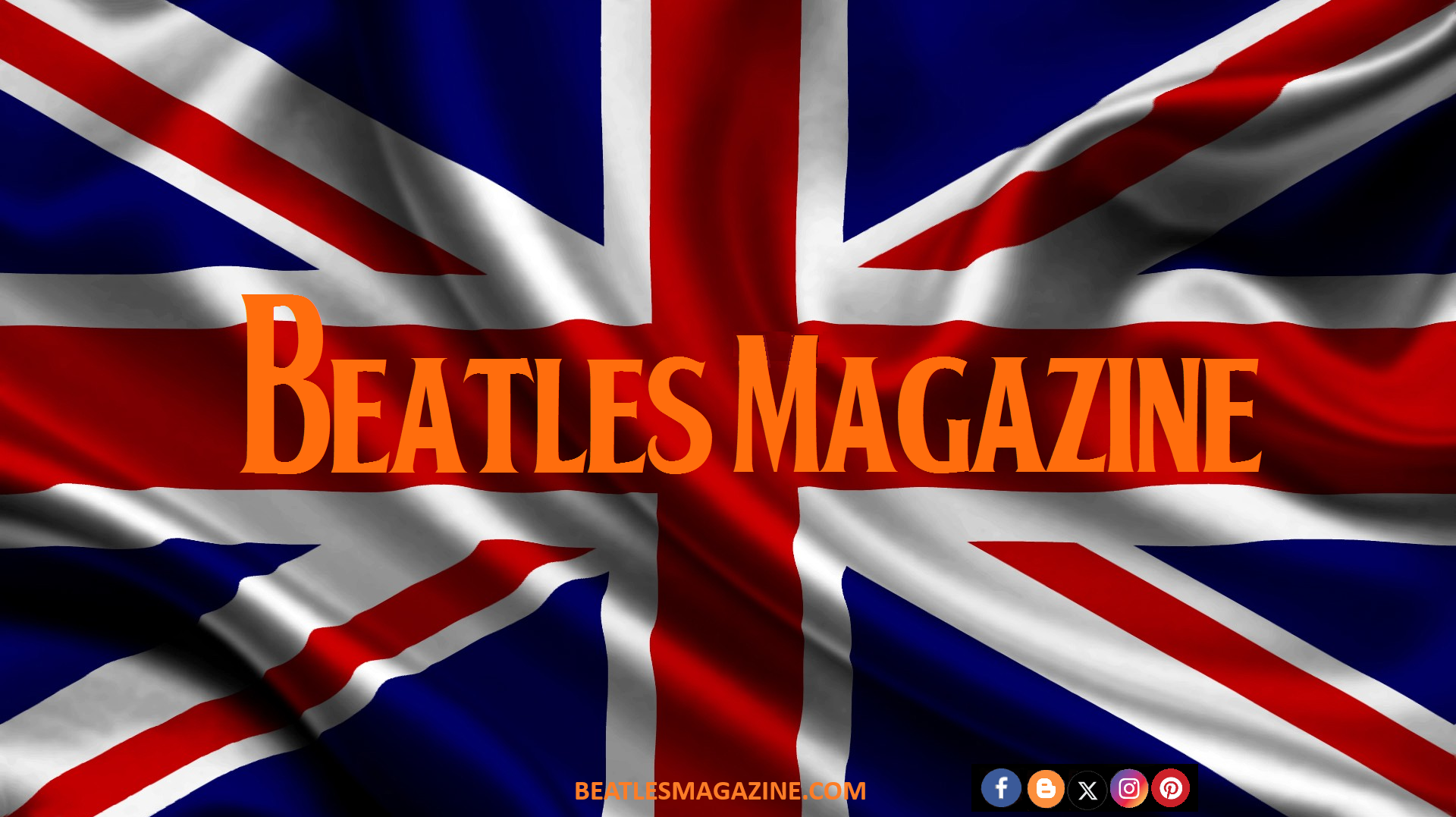14 years before Live Aid, on 1 August 1971, George Harrison, along with his friend and mentor Ravi Shankar and a host of other stars, pulled off something that had never been achieved, or even attempted before: the two Concerts For Bangla Desh at Madison Square Garden in New York.
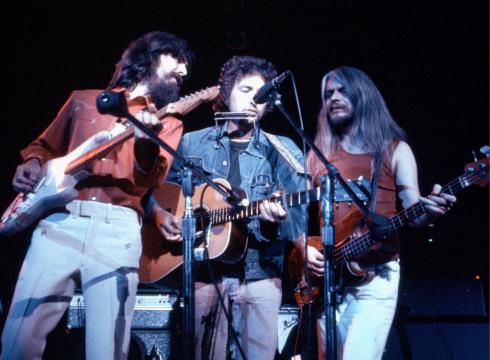 George had been deeply moved when Shankar had brought to his attention the plight of millions of starving refugees, in what was formerly East Pakistan, who were suffering the effects of the Bhola cyclone of 1970 and the ‘Liberation War’ in their country. Five days before the concert, on July 27, George released his single ‘Bangla Desh’ on the Apple label, bringing this humanitarian crisis to the world’s attention in a way that only a world-famous former Beatle could. On the day of the single’s release, George and Ravi Shankar held a press conference to announce their ambitious concert that was to be held a few days later.
George had been deeply moved when Shankar had brought to his attention the plight of millions of starving refugees, in what was formerly East Pakistan, who were suffering the effects of the Bhola cyclone of 1970 and the ‘Liberation War’ in their country. Five days before the concert, on July 27, George released his single ‘Bangla Desh’ on the Apple label, bringing this humanitarian crisis to the world’s attention in a way that only a world-famous former Beatle could. On the day of the single’s release, George and Ravi Shankar held a press conference to announce their ambitious concert that was to be held a few days later.
Following rehearsals in New York, the two concerts took place on 1 August at 2.30pm and 8pm in Manhattan in front of over 40,000 people. The audience was treated to a spectacular bill that included Eric Clapton, Bob Dylan, Shankar, Leon Russell, Ringo Starr, Hindustani musician Ali Akbar Khan, Billy Preston, Klaus Voorman, Bobby Whitlock, Don Preston, Jesse Ed Davies, Carl Radle and the Apple-signed band, Badfinger.
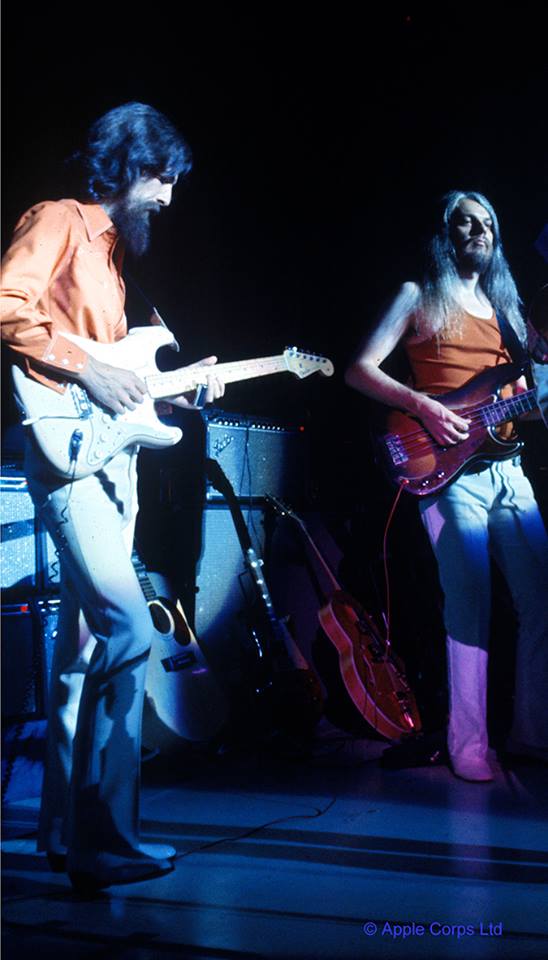 The concerts, like the album, began with Ravi Shanker accompanied by sarodya player Ali Akbar Khan, tabla player Alla Rakha and Kamala Chakravarty on tamboura, performing ‘Bangla Dhun’.
The concerts, like the album, began with Ravi Shanker accompanied by sarodya player Ali Akbar Khan, tabla player Alla Rakha and Kamala Chakravarty on tamboura, performing ‘Bangla Dhun’.
There then followed George along with Ringo, Eric Clapton (who was not well), Leon Russell, Billy Preston, Klaus Voormann, Jim Keltner and eighteen other musicians. They performed ‘Wah-Wah’, ‘Something’, ‘Awaiting on You All’, ‘That’s the Way God Planned It’ sung by Billy Preston, Ringo’s ‘It Don’t Come Easy’, ‘Beware of Darkness’ and ‘While My Guitar Gently Weeps’ featuring both George and Eric Clapton. Leon Russell then took centre stage for the medley of The Rolling Stones’ ‘Jumpin’ Jack Flash’ and the Coasters’ ‘Young Blood’.
George then performed ‘Here Comes the Sun’ with Badfinger’s Pete Ham on acoustic guitars and Don Nix’s gospel choir. George then picked up his white Fender Stratocaster and looked at the set list taped to the body of the guitar and saw ‘Bob?’ According to George: “And I looked around, and he was so nervous – he had his guitar on and his shades – he was sort of coming on, coming [pumps his arms and shoulders] … It was only at that moment that I knew for sure he was going to do it.” The audience went into raptures after a moment of quiet astonishment as this was Dylan’s first appearance before an American audience in half a decade.
For Dylan’s mini-set he was backed by Harrison, Leon Russell (playing Voormann’s bass) and Starr on tambourine; Dylan played five songs ‘A Hard Rain’s A-Gonna Fall’, ‘Blowin’ in the Wind’, ‘It Takes a Lot to Laugh, It Takes a Train to Cry’, ‘Love Minus Zero/No Limit’ and ‘Just Like a Woman’. After which George and the band returned to perform ‘Hear Me Lord’, ‘My Sweet Lord’ and ‘Bangla Desh’.
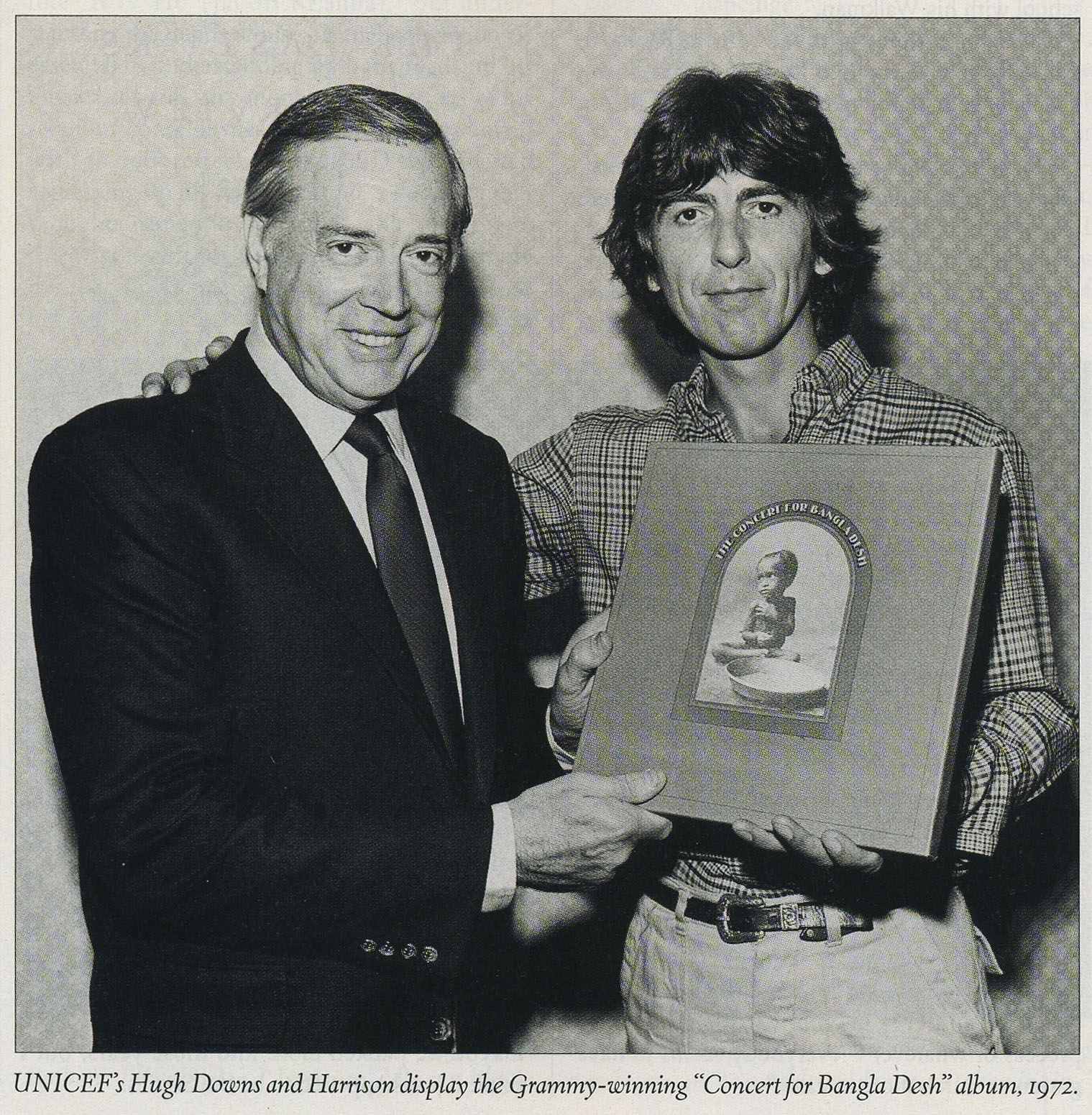
For the evening show, which is widely regarded as superior to the first show, the songs played and the sequence they were played in were slightly different. After George’s opening and closing mini-sets he played ‘Wah-Wah’ and brought ‘My Sweet Lord’ forward in the order. That was followed by ‘Awaiting on You All’ and then Billy Preston performed ‘That’s The Way God Planned It’. ‘Hear Me Lord’ was dropped in the evening so that the post-Dylan set was just ’Something’ and ‘Bangla Desh’. Dylan shuffled his set a little and played ‘Mr. Tambourine Man’ in place of ‘Love Minus Zero/Mo Limit’.
Mixing the concert audio was undertaken at A&M Studios in Los Angeles during September. Music from both the afternoon and evening performances was used for the album; in the main it was the second show that was preferred. The songs from the afternoon show that were used are ‘Wah-Wah’, which starts with the evening version but cuts to the matinee, George’s band introduction, ‘While My Guitar Gently Weeps’ and the Leon Russell medley.
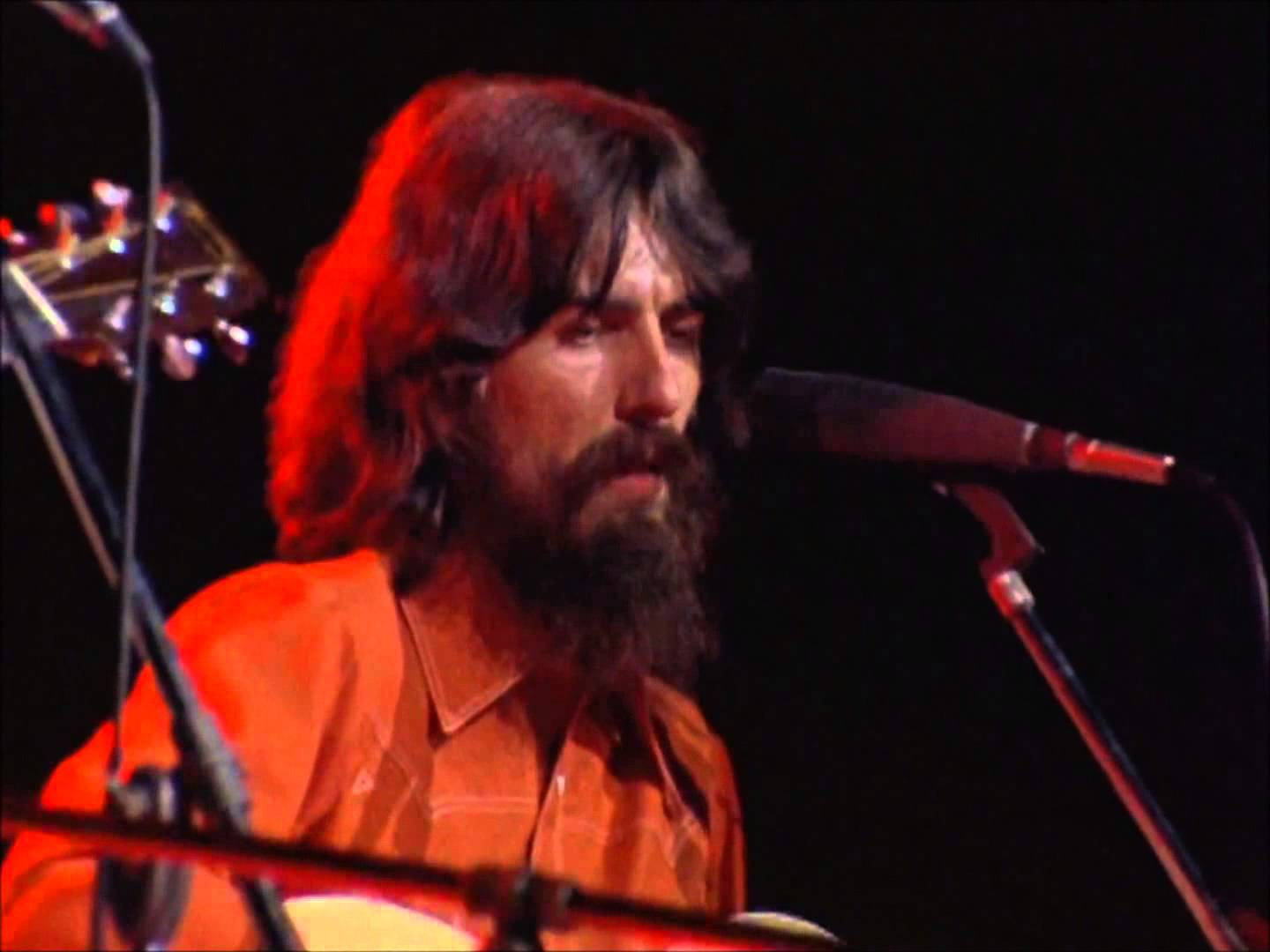 The triple LP box set was released in the US on 20 December 1971 and 10 January 1972 in the UK. “Harrison & Friends Dish Out Super Concert For Pakistan Aid” was the headline for Billboard magazine’s news story in the August 14 issue. “Almost all of the music reflected what must have been the feelings of each musician who gave his time and tremendous efforts for free, to help a helpless country.”
The triple LP box set was released in the US on 20 December 1971 and 10 January 1972 in the UK. “Harrison & Friends Dish Out Super Concert For Pakistan Aid” was the headline for Billboard magazine’s news story in the August 14 issue. “Almost all of the music reflected what must have been the feelings of each musician who gave his time and tremendous efforts for free, to help a helpless country.”
The album entered the Billboard chart on 8 January 1972 and went to No.2 on the US chart, where it spent 6 weeks, never quite making it to the top spot. In the UK it topped the charts, three weeks after its release. The fundraisers generated an estimated $250,000 for famine relief in the country, close to $1.5 million in today’s terms. The concert was released as a DVD in 2005, and continues (along with the album) to raise funds for what is now called the George Harrison Fund For UNICEF.
In 2006, Olivia Harrison attended a ceremony at Madison Square Garden to mark the 35th anniversary of the concerts and to unveil a permanent plaque in the arena’s Walk of Fame. Today we have become so used to artists supporting causes with charity concerts, charity recordings, and in many other ways, and it is wonderful that people use their fame in this way. However, George was way ahead of the curve and his humanitarian work was groundbreaking – proving to be an inspiration for many that have followed.
George Harrison was a true humanitarian.
